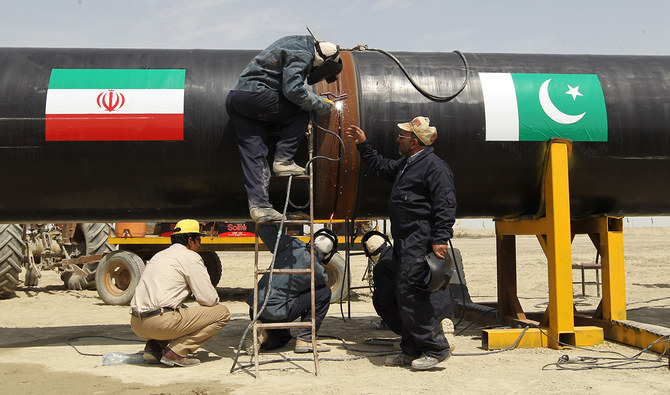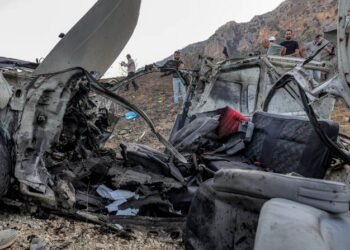Pakistan has cancelled the building of its major gas pipeline with Iran due to the threat of economic sanctions imposed by the United States. The decision seemingly concludes around a decade of expectations for the project.
The US sanction imposed on Iran over its nuclear programme disrupted the completion of the Iran-Pakistan pipeline, a now bilateral project formerly known as the India-Pakistan-Iran gas pipeline.
Pakistan’s Minister of State for Petroleum Dr Musadik Malik said in written testimony to the National Assembly that, “Pakistan has issued a Force Majeure and Excusing Event notice to Iran under the Gas Sales and Purchase Agreement (GSPA), which resultantly suspends Pakistan’s obligations under the GSPA.”
He confirmed that the pipeline – which aimed to supply 750 million cubic feet of gas per day to Pakistan from its western neighbour – “is stalled due to international sanctions on Iran”, and will only resume once the sanctions are lifted and no longer threaten to hit Pakistan’s own state-owned entities. In that regard, “No date and deadline can be given for the completion of the Iran-Pakistan Gas Pipeline Project.”
![US sanctions threat: Pakistan abandons Iran gas pipeline project 3 Image of the South Pars Gas Complex plant in Iran [Hamed Malekpour/Wikipedia]](https://i0.wp.com/www.middleeastmonitor.com/wp-content/uploads/2016/12/2013_12_11South-Pars-Onshore-Facilities-in-iran-1.jpg?resize=1200%2C800&quality=85&strip=all&zoom=1&ssl=1)
Malik outlined, however, that the dispute can only be settled through international arbitration if Iran does not accept Pakistan’s notice. Consequently, “The exact amount of a penalty, if any, is subject to the outcome of the arbitration to be determined by the arbitrators.”
Pakistan’s force majeure notice based on external factors beyond its control comes a week after the visit to the country by Iranian Foreign Minister Hossein Amir Abdollahian, during which he urged the completion of the project as one that would benefit both nations. He also discussed with his Pakistani counterpart, Bilawal Bhutto, potential solutions to existing financial problems between them.
Amid Pakistan’s existing economic crisis, the nation of over 245 million people experiences regular blackouts of around 12 hours per day and sometimes more, making the supply of gas and electricity a major priority for the Pakistani government.
While Iran has reportedly completed its side of the project, having constructed hundreds of kilometres of the pipeline, Pakistan has long questioned its ability to finish its end of the line due to its rampant economic struggles and the threat of US sanctions.
In recent years, Islamabad has attempted to persuade Washington to exempt it from sanctions and measures in order to allow it to complete the pipeline project. Just as the US government temporarily exempted humanitarian relief-related trade from the sanctions imposed on Syria after the deadly earthquake that struck the country in February, Pakistan may similarly seek sanctions exemption in relation to its energy supply from Iran.
“The Government of Pakistan is engaged with the US authorities, through diplomatic channels, to seek exemption for the project,” said Malik. “All necessary actions are being taken to construct the gas pipeline at the earliest”.
Despite those overtures by Pakistan earlier this year, the US has not given any response. If Washington does not give the green light for the project to go ahead on humanitarian and energy grounds, it is expected that Islamabad will demand that it pays any penalty imposed by Tehran.
Discissions to build the 2,775-kilometer pipeline to deliver natural gas from Iran to Pakistan began in 1995. The project was launched in 2013, with operations set to begin by the end of 2014 as Iran had invested around $2bn.
Under an agreement signed between the two countries in 2009, the gas pipeline project was to be completed by December 2014 and would deliver 21.5 million cubic meters (760,000 million cubic feet) of gas per day to Pakistan. It was to be constructed using a segmented approach, which means Iran had to lay down the pipeline on its side and Pakistan was supposed to build the pipeline on its territory.
However, the two countries were aware of the risks incurred with international sanctions regarding Tehran’s nuclear programme. The US imposed sanctions on companies producing, selling and shipping Iranian Petrochemicals and Petroleum in February.









 United Arab Emirates Dirham Exchange Rate
United Arab Emirates Dirham Exchange Rate

